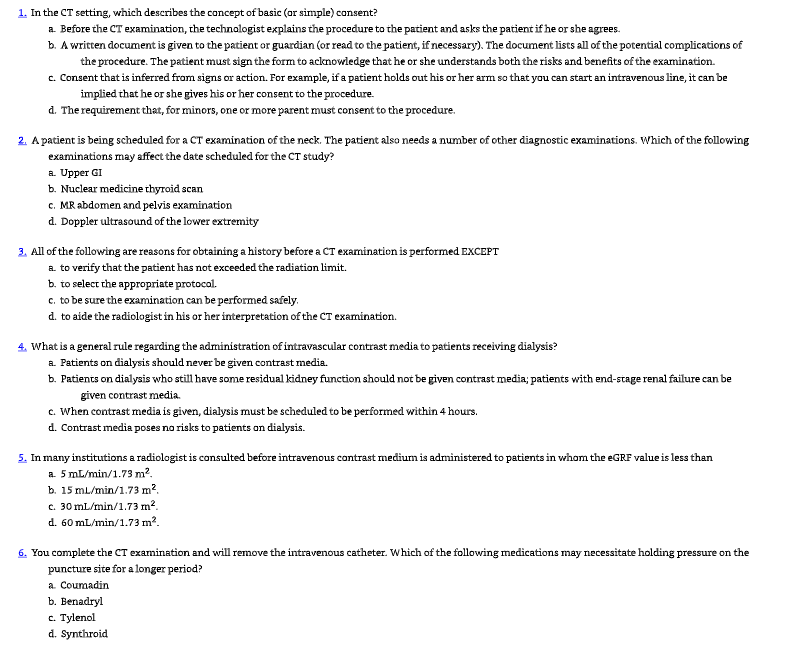1. In the CT setting, which describes the concept of basic (or simple) consent? a. Before the CT examination, the technologist explains the procedure to the patient and asks the pa... 1. In the CT setting, which describes the concept of basic (or simple) consent? a. Before the CT examination, the technologist explains the procedure to the patient and asks the patient if he or she agrees. b. A written document is given to the patient or guardian (or read to the patient, if necessary). The document lists all of the potential complications of the procedure. The patient must sign the form to acknowledge that he or she understands both the risks and benefits of the examination. c. Consent that is inferred from signs or action. For example, if a patient holds out his or her arm so that you can start an intravenous line, it can be implied that he or she gives his or her consent to the procedure. d. The requirement that, for minors, one or more parent must consent to the procedure. 2. A patient is being scheduled for a CT examination of the neck. The patient also needs a number of other diagnostic examinations. Which of the following examinations may affect the date scheduled for the CT study? a. Upper GI b. Nuclear medicine thyroid scan c. MR abdomen and pelvis examination d. Doppler ultrasound of the lower extremity 3. All of the following are reasons for obtaining a history before a CT examination is performed EXCEPT a. to verify that the patient has not exceeded the radiation limit. b. to select the appropriate protocol. c. to be sure the examination can be performed safely. d. to aide the radiologist in his or her interpretation of the CT examination. 4. What is a general rule regarding the administration of intravascular contrast media to patients receiving dialysis? a. Patients on dialysis should never be given contrast media. b. Patients on dialysis who still have some residual kidney function should not be given contrast media; patients with end-stage renal failure can be given contrast media. c. When contrast media is given, dialysis must be scheduled to be performed within 4 hours. d. Contrast media poses no risks to patients on dialysis. 5. In many institutions a radiologist is consulted before intravenous contrast medium is administered to patients in whom the eGFR value is less than a. 5 mL/min/1.73 m². b. 15 mL/min/1.73 m². c. 30 mL/min/1.73 m². d. 60 mL/min/1.73 m². 6. You complete the CT examination and will remove the intravenous catheter. Which of the following medications may necessitate holding pressure on the puncture site for a longer period? a. Coumadin b. Benadryl c. Tylenol d. Synthroid

Understand the Problem
The question includes multiple-choice queries related to CT examinations, patient consent, administration of contrast media, and associated medical protocols. It is primarily concerned with medical practices and guidelines.
Answer
1. a, 2. a, 3. a, 4. b, 5. c, 6. a
The final answers are: 1. a, 2. a, 3. a, 4. b, 5. c, 6. a
Answer for screen readers
The final answers are: 1. a, 2. a, 3. a, 4. b, 5. c, 6. a
More Information
Basic consent is simple and involves an explanation by the technologist and agreement by the patient. Upper GI examinations can affect CT scheduling due to the digestive tract's preparation requirement. Safety, protocol selection, and radiologist interpretation require history. Patients with end-stage renal failure may receive contrast. eGFR below 30 needs radiologist consultation. Coumadin may require extended pressure to control bleeding.
Tips
A common mistake is misunderstanding the necessity of patient history to ensure correct protocol and safe procedure execution.